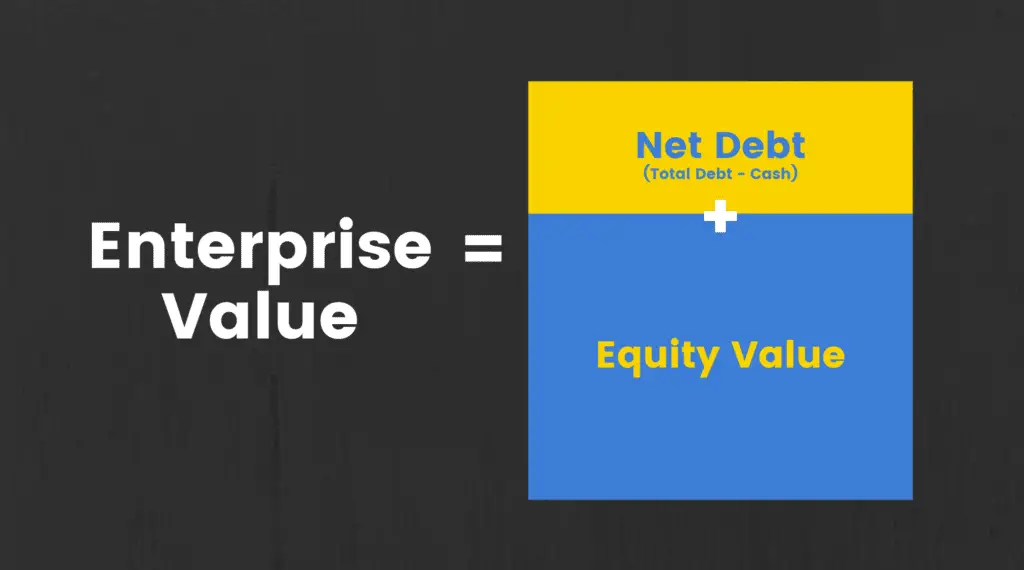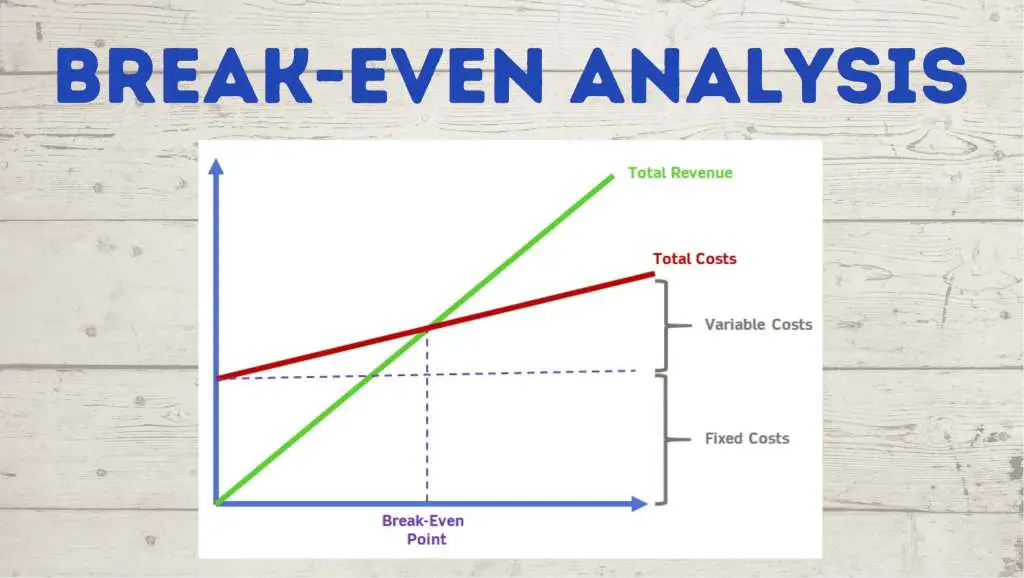This post may contain affiliate links, which means I’ll receive a commission if you purchase through my links, at no extra cost to you. Please read full disclosure for more information.
WHAT IS ENTERPRISE VALUE (EV)?
Enterprise value, or EV, is a measure of the total value of a company. This is not to be confused with the market capitalization (market cap) value.
Market cap is the equity value of a company, whereas enterprise value is the entire market value of the firm. The entire value consists of market cap as well as debt and cash.
An easy way to grasp the enterprise value is to think of it as the price you would pay to purchase a company in its entirety. If you were to purchase a company, you would be paying the value of the market cap as well as the value of short-term debt, long-term debt, and cash on the company’s balance sheet. Doing this accounts for all ownership interests and claims to assets from equity and debt.
WHY ENTERPRISE VALUE IS IMPORTANT
Enterprise value is popularly used for valuation purposes. If you were a company or firm interested in acquiring another company, you would need to know what the entire value of the firm is, since this is the price you would pay.
The metric is used in a number of financial ratios including EV/EBITDA, EV/EBIT, and EV/Sales.
These ratios can be superior for valuing companies and using comparable analysis. Other metrics such as the P/E ratio do not consider cash and debt. If two companies being compared have substantial differences in cash and debt, a comparison using the P/E ratio would look drastically different than a comparison using EV/EBITDA.
Check out these related posts as well:
- What is EBITDA?
- What is Free Cash Flow?
- What is IRR?
- What is Cash on Cash Return?
- What is Net Operating Income?
ENTERPRISE VALUE FORMULA AND CALCULATION
Walking through the formula for enterprise value can help you understand the explanation above.
Enterprise Value = Market Cap + Net Debt
Net Debt = Total Debt – Cash and Cash Equivalents
Enterprise Value = Market Cap + Total Debt – Cash and Cash Equivalents
Let’s break down the components of the formula.
Market Capitalization

Market cap is the equity value of a company, which is simply calculated by multiplying the company’s number of outstanding shares by the current share price.
If a company’s share price is $20 and there are 500 million shares, the market cap would be $10 billion.
When a company purchases another, it will have to buy out all the shareholders. In this example, the shareholders own $10 billion worth of shares. Therefore, the acquiring company will need to spend $10 billion to take care of the shareholders. With the shareholders accounted for, the acquiring company will then consider the debt and cash of the target company (company being acquired).
Net Debt

Net debt is simply total debt minus cash.
Total Debt
Total debt includes both short-term and long-term debt. The acquiring company will assume all the debt liability that the target company has. For that reason, it is added in the enterprise value formula.
Cash
Cash and cash equivalents are liquid assets that are subtracted in the enterprise value formula. When an acquiring company purchases another company, it will keep the cash reserves that the target company has. Cash is subtracted because it is assumed that the acquiring company will use that cash to pay for a portion of the takeover price.
Impact of debt and cash on enterprise value
More debt will increase the EV of a company and more cash will decrease the EV.
EXAMPLE OF ENTERPRISE VALUE CALCULATION
In this example, ABC Company has 500 million shares outstanding and the current stock price is $20 per share.
On the balance sheet, ABC Company has short-term debt of $1 billion and long-term debt of $4,000,000. The company’s cash and cash equivalents amount to $3 billion.

Once these values are identified, solving for enterprise value is simple.

Market cap is the $20 share price multiplied by 500 million shares. The result is $10 billion. Total debt is $5 billion. Cash is $3 billion. Plug those values into the formula and you arrive at an enterprise value of $12 billion.
DRAWBACK OF ENTERPRISE VALUE
The enterprise value alone is not enough to make a sound decision. A drawback of the enterprise value is that the number does not tell the whole story behind a company.
It’s important to understand the nature of the business and its industry. It’s also important to consider what stage of the business cycle the company is in. Debt and cash levels will fluctuate based on many factors, some including:
- How capital intensive the business is
- The level of working capital a company has
- What debt is being used for
- Whether the company is in a stage of growth or not
These factors can result in a skewed enterprise value. Not knowing this can lead to decisions made based on misleading information.
Like all financial measures, one cannot simply look at the numerical value. One has to understand the components that make up the measure and how they all relate.
CAN ENTERPRISE VALUE BE NEGATIVE?
If you calculate the enterprise value of a company and come up with a negative value, don’t assume you made a mistake. It is possible for a company to have a negative enterprise value. Let’s revisit the formula:
Enterprise Value = Market Cap + Debt – Cash
For enterprise value to be negative, a company would have to have a cash balance larger than the sum of the market cap of the company and its debt.
While not normal, this isn’t impossible.
A company’s recent decline in stock price can result in a low equity value. If that company has a low debt value and is sitting on a large cash pile, a negative enterprise value would result.
SUMMARY
Enterprise value isn’t a common term the average person would hear often. If you work in investment banking, private equity, and other related industries, enterprise value is a metric you’ll be using and calculating daily.
Enterprise value represents the entire market value of a company. It takes into account market cap, debt, and cash for a comprehensive measure of value. This value is the purchase price and acquiring company would pay when buying a target company.
EV is also used in a variety of financial ratios used for valuation and performance analysis.



